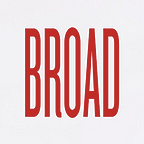“Gorbachev’s Birthmark,” a poem by Jonathan Fink.
The rivalries of sport and politics.
“It’s tempting, though inaccurate, to believe that what the coaches tried to teach us was acceptance of surrender…”
Gorbachev’s Birthmark
-
The coaches called it “dressing out,” our transformation
after lunch, four days a week (with Art instead on Fridays)
into gray elastic-waistband shorts and V-neck shirts,
our surnames stitched in neon orange two inches
to the right and three above the heart. We had seven minutes
from the bell to find our seated places on the court,
and mine, in memory, was on the three-point line,
not at the apex of the arc, but just beyond, the beginning
of the curve’s descent. When one of us was late, unkempt,
the coaches made us do an exercise called “squat-thrusts”
where we placed our hands against the floor
and shot our feet behind us, brought them in, then leapt
into the air, our fingers spread in “jazz hands”
(though the coaches never would have used that term)
as the thinnest coach, Coach Wayland, gave a lecture
on the Russians, how we’d never beat them with our shoes
untied, and the oldest coach, Coach Day, counted down
as if to launch, his face crimson as Gorbachev’s birthmark.
-
These were the afternoons of shuttle runs and “suicides,”
dodgeball, which the fattest coach called “murder ball”
while twirling a whistle, winding and unwinding
its string around two fingers. We Greco-Roman wrestled
on a rollout mat, were drilled on ancient holds and moves:
the guillotine, the ankle pic, the arm bar and the barrel roll.
Outside of class, we mimicked Rowdy Roddy Piper’s brogue
and Jimmy “Superfly” Snuka’s leaps, but inside the locker room
we neither preened nor primped, but steeled ourselves
with faux solemnity for battle. “It’s not the size of the dog
in the fight; it’s the size of the fight in the dog,” Coach Wayland,
sitting backward in a metal folding chair, would say
as boys were weighed and partnered up, his right hand lifting
to his bottom lip an empty soda can into which he’d spit
tobacco juice then wipe his mouth on the back of his arm.
-
The coaches often paired me (I was wiry, fast)
with a heavy, slower boy, and as I slipped and moved,
evaded and rejoined, they called out instructions
(“reversal,” “roll,” “lock the leg”) until the other boy
would sometimes quit, his asthma winning out,
or he would trap me under him with more of a flop
than a practiced move as Coach Day, on hands
and knees, hovered his palm above the mat to strike it
the moment both my shoulders came to rest.
-
It’s tempting, though inaccurate, to believe that what
the coaches tried to teach us was acceptance of surrender,
what the Baptist preachers in our small town might have claimed
to be the hand of God descending, or Jacob grappling with the angel.
“You think the Ruskies give up so easy?” Coach Wayland,
bending down beside us on the mat, whispered in our ears.
He called us, “girl-boys,” “pansies,” “pantywaists,”
and though I knew these men had wives and kids
(I once congratulated the fattest coach on a newborn son,
a fact I’d learned because my mother labored with his wife
in the public schools; bemused, he’d scratched his head
and studied me and almost smiled), but it was hard
to imagine they ever left the gym, the locker room,
that, like cosmonauts, they perpetually orbited its atmosphere,
inhospitable as deep space, all sweat and cheap cologne.
-
By the time the Berlin Wall came down, we’d moved on
to badminton, a juggling unit, lawn bowling on the soccer field.
Promotion to the high school loomed, and as winter
turned to spring, my peers and I abandoned Wayland,
Day, and left them barking orders in our wake.
“Old soldiers never die; they just fade away,” MacArthur said,
which we did, pleasantly, to trigonometry and tennis,
then college, jobs, and families. And as the coaches faded
to administrative positions or to history classrooms
when budget cuts to gym descended, the great threats of which
Coach Day and Wayland warned never entered in our lives.
Instead, older now than they were then, I find an eagerness
that rises in the long, dull slog of middle age to push aside
the boardroom table, mid-PowerPoint, and take my colleague Jones
or Johnson in a figure-four or hammerlock, perhaps a hip throw
in a Brooks Brothers suit. “What the hell are you waiting for?”
Coach Day will whisper in my ear. “I’ll explain it
to the boss,” Coach Wayland answers. “Comrades,” I’ll say
to Johnson and Jones as they remove their jackets and start
to circle the makeshift mat, “you have but one life to live.
Be vigilant. Be bold. At the whistle, begin.”
*******************************************
Jonathan Fink is the author of two poetry collections: The Crossing (Dzanc, 2015) and Barbarossa: The German Invasion of the Soviet Union and the Siege of Leningrad (Dzanc, 2016), both of which received honors from diverse organizations. Jonathan’s poems have also appeared in The New York Times Magazine, Poetry, New England Review, TriQuarterly, Slate, The Southern Review, and Virginia Quarterly Review, and he has received grants from the National Endowment for the Arts, the Florida Division of Cultural Affairs, the St. Botolph Club Foundation, and others.
